Text

Meet "Nanay"
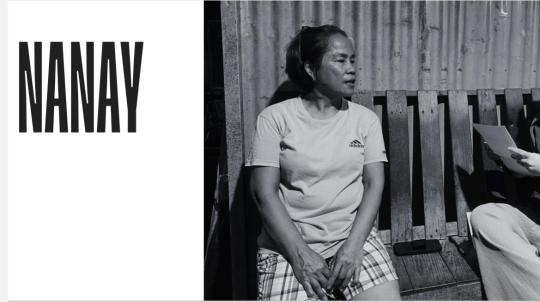
At Nanay's age, physical changes and challenges are a natural part of life. She shared how mobility has become more limited, requiring assistance for certain tasks like going to the store. Managing health conditions such as high blood pressure and sugar levels has also become a priority for her. To maintain her well-being, Nanay focuses on strategies like controlling her diet, staying calm, and continuing to find purpose through work, which she believes is vital in keeping her body and mind active despite the challenges she faces.
Cognitively, Nanay has noticed changes in her memory and decision-making abilities. However, she remains proactive in staying mentally sharp by engaging in activities like walking, visiting friends, and taking moments to relax. She also finds strength in her faith, often visiting places like the church to find peace and clarity. For Nanay, adapting to cognitive changes means creating a balance between relaxation and engaging in meaningful tasks that stimulate her mind and help her navigate everyday challenges.
Socially and emotionally, Nanay emphasizes the importance of staying connected with loved ones. She acknowledges how her relationships with family and friends have evolved, focusing on openness and avoiding conflicts. Nanay finds meaning and fulfillment in her work and takes pride in her accomplishments, such as cultivating vegetables, which she enjoys. Reflecting on her past struggles and achievements, she feels a sense of pride in the life she has built and defines happiness as being surrounded by meaningful connections and staying true to her purpose.
0 notes
Text

Middle adulthood is the stage of life that begins at 40s and extends to about 65 years of age. In this time period, physical changes occur which signifies that the person begins to age.
Meet "Anan"

In the blog about infancy, we have interviewed Anan about her son, Timtim's, development. Now, we had interviewed Anan about her life as a middle adult. Here's what we know about her.
(P.s: due to the bad weather, we were not able to administer the interview in person. In addition, Anan's signal was also poor, thus not being able to do video calls. With the help of her daughter, we were able to do voice message via Messenger.)
Entering her 40s, Anan noticed a decline in her physical health, she could not do any extreme activities unlike before. Moreover, she noticed a lot of physical problems compared to the times when she was still working. She also has a lot of health problems, and she managed these by going to check-ups and not getting herself stressed and to be less active than before, as per doctor's advice.
When it comes to her cognitive functioning, Anan stated that it had improved thanks to the technology which causes it to improve further. There were times that she would ask her daughter about things that she does not know, but it does not really affect her overall cognitively, according to her. Furthermore, due to her being a stay-at-home mother, she had further enhanced her skill in cooking. We, the interviewers, could attest to this since we had tasted one of her delicacies while we were there during the time we interviewed her about Timtim.
We had asked Anan what makes her happy and satisfied in life, and what she stated gave warmth to our hearts. "My children, pag okay ilang health, [pag] happy sila, diha ko maka ingon na satisfied ko, na happy ko." Indeed the mother's love is one of the greatest love one could ever have. This made us realize that as an adult grows to have his or her own family, their satisfaction and happiness comes from seeing their child happy. Aside from the satisfaction she had in this stage of life, Anan also has challenges faced, just like family problems. We had not asked her further with this matter since she has asked to, with that, we respected her decision to not disclose the topic.
With this interview we had with Anan, we gained insights about what middle adulthood is like. This interview has given us the opportunity to take a glimpse of Anan's life. Moreover, through this interview we knew that physical skills and health indeed would decline in this stage of life, more so that health problems are prevalent during middle adulthood.
To wrap up this blog, Anan had left a message to the younger ones: to be disciplined, punctual, to have a "successful" attitude, have an active mindset, and to always do something for yourself.
0 notes
Text
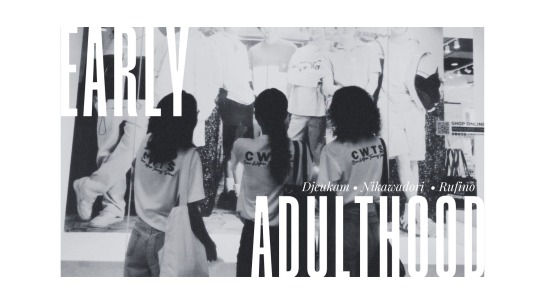
Early adulthood occurs when an individual reaches the ages 20s to 30s. This stage of development is marked by significant life events such as graduating, getting a job, forming relationships, one's own family, and friendships. Compared to the previous developmental stages, early adulthood is the time for intellectual growth. Emotional and cognitive factors would begin to develop drastically, given that this is the stage wherein our brain becomes mature.
As we, people, grow, we become more aware of the world we are living in; we experience milestones in our lives that make us learn more about ourselves, which, in return, shapes us into who we are. We meet people, form deep connections with them, and start focusing on building our careers. We also begin to face great responsibilities in life, just like Francis.
Meet Francis

Francis, a college student in his 20s, is an officer in his program's student organization. We asked Francis questions about his physical, cognitive, and socioemotional milestones as well as the challenges and satisfaction he has experienced as a young adult. In addition, we have also related some questions to his position in the student organization.
After transitioning as a young adult, Francis has noticed some physical changes. He noticed that his body had become agile. This agility that he had acquired was due to him joining mixed martial arts. Thus, resulting in his body being trained. Moreover, he also began working out when he was still in 7th grade. With these activities he had done in his adolescence, he was not able to pinpoint exactly when he noticed these physical changes, but if he had not done these activities, he would not be physically fit by now. Francis' voice had changed as well. The drastic change in his voice occurred when he was about the age of 16, his parents and peers had noticed that his voice had gotten deeper than usual.
In the year 2020, Francis experienced illness anxiety symptoms, in which an individual might feel fear that they may have serious illnesses despite manifesting little to no symptoms. Without this, Francis stated that his health would have been a lot better. With the physical activities that he has done since then, he does not get tired easily, and his immune system has improved compared to his health back when he was once a sick child. He noticed that his health had improved and that he would only get fevers twice a year. To stay physically healthy, Francis does a lot of activities. Just as mentioned previously, he works out. He has a workout regimen that he regularly follows three to four times a week. This regimen consists mostly of calisthenics. However, he also includes weights in his workout routine. In addition, he tries to attain at least 7 hours of sleep every night. Overall, Francis is pretty satisfied with his overall physical health and appearance. But if given a chance to improve it further, he would grab the opportunity to do so.
With his high position in the student organization, comes great responsibilities and demands. Balancing org life, academic life, and social life at once is no easy task. In Francis' case, he acknowledges the importance of rest in balancing these dimensions. Thus, he tries to prioritize it, though sometimes he would not be able to get 7 hours of sleep, which according to him, is the preferable hours of sleep needed. Furthermore, he finds comfort in being alone and gains his energy through his alone times. When it comes to balancing his organizational, academic, and social life, Francis admitted that sometimes there are certain factors wherein he would compromise one thing over the other. For instance, when he would become busy in his duty as an officer, it would lead him to not be able to attend to his studies. Francis stated that sometimes he needs to accept that he could not get everything and that he has to become more forgiving of himself for that. Whenever schedules and tasks from both responsibilities would collide, stress would arise. What Francis does is he tries to sublimate the stress into doing things he finds enjoyable.
Compared to the previous times, Francis has become firm in himself now that he has become a young adult, especially after being appointed as an officer. He thinks and analyzes things before making firm decisions. This has also reflected in how he treats others.
Francis' relationship with his friends and peers is good. When there are conflicts that may arise, which is inevitable, he tries to confront them as much as possible despite not being a confrontational person. Despite his busy schedule, he still has time to spend with his friends, especially during the times when he works as an officer. His outside school friends are low maintenance, according to him. They do not hang out all the time but still have a strong bond between them.
One of the biggest challenges that Francis faced as a young adult was his future. With the lessons that he has learned in his life, he realized that what he does in his present moment will reflect in the future. Thus, he needs to get things right in the present for his future to be right. In addition, a lot of people have high expectations of him, expecting him to have a good and stable job in the future and could provide things and the like. These expectations people have on him added to the pressure he has. He feels the need to exert more effort in the things he does to meet everyone's expectations. Although he is pressured, he knows how to manage such strong feeling by grounding himself and knowing his limitations. Another challenge Francis has faced is confusion. He then further elaborated that he thinks he has it all figured out but it turns out he does not. He thinks he knows himself well, but in reality, he does not. With this, he needs to be reintroduced and to learn more about himself or an aspect he thought he knew of.
At the end of the interview, Francis stated that he needed to know himself more, figure out how to manage his stress more by doing healthy practices, connect more with people, and become assertive, especially in line with his role in the student organization. To add, Francis has no regret for the things he has and has not done in the past, but for one thing, which is discipline. He stated that during his adolescence, he was very lazy, especially in his schoolwork; he tended to work on it on the day of the submission. Thus, he further added that if he had been more disciplined before, just like he was now, life would have been easier for him. Lastly, Francis has noticed that he tends to adjust his behavior or his personality in accordance to what people want to see on him or what he thinks people want to see on him which leads to internal conflict on who he truly is as a person. Hence, the advice he would like to give to his younger self upon stepping into adulthood is to always remember who you are.
With this interview that we had with Francis, we have gained insights about his life and perspective on becoming a young adult. Based on his responses, he has emphasized the importance of sleep on one's physical and cognitive well-being. Sleep is important not just in early adulthood, but in every stage of development as it helps replenish and energize our body. It is one of the crucial factors for healthy development.
According to Erik Erikson's psychosocial theory, early adulthood is the time when an individual must establish intimacy with other people, or it may lead them to feel isolated from others. Intimacy does not necessarily involve romantic relationships; it can be found with friends and family as well. In the case of Francis, he finds intimacy with his friends and peers.
To Francis, may you continue to grow into what you aspire to be and bloom like the most beautiful flower existing in the garden.
Documentation



0 notes
Text
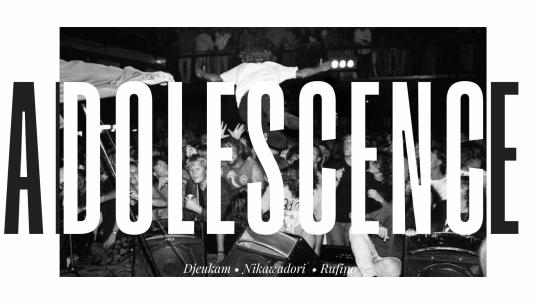
Adolescence, which usually spans the early to late teen years, is a time when young people start discovering who they are and figuring out their place in the world. It’s a stage marked by big changes, not just in the body but also in how one thinks and feels. During this time, teenagers experience important life events like graduating, making new friends, and developing their own ideas and beliefs. These experiences help shape who they will become in adulthood.
Meet Farrell

Farrell's journey through adolescence—we see how he begins to discover himself and understand the world around him. Each experience teaches him something new, helping him grow and shape his identity. He meets people who leave lasting marks on his life, builds friendships that define him, and starts envisioning his future goals and responsibilities.
Farrell mentioned that in his youth, his voice was high-pitched, but upon turning 13, it shifted to a deeper tone. He also gained muscles and facial hair. He remarked that he became increasingly masculine as he aged. At this point in life, he noted that he was inspired to participate in physical activities and maintain a balanced lifestyle. He maintains a routine for his workouts and allocates equal time for rest to support his mental well-being. He mentioned that he was struggling to budget his meals while ensuring they were both healthy and inexpensive. He appreciates the nutrients it provides for his health while maintaining financial responsibility. Concerning his contentment with his present body composition, he assessed himself as a 5 on a scale from 1 to 10. As he mentioned before, he still has fitness objectives that he aims to reach as a 19-year-old man. Concerning his cognitive challenges, he stated that he is experiencing difficulty maintaining a strong focus on his studies due to distractions from social media.
Farrell revealed that in his youth, he often made decisions based on his impulsive ideas, but as he matured, he became better at handling situations he typically avoided when he was younger. His capacity for learning arises from his desire to cultivate a habit of acquiring knowledge about topics that fascinated him, which includes his learning abilities. He mentioned that his life goals are difficult to reach without consistency. That is why he stressed the importance of discipline and healthy habits at this point in his life. His belief in making wise choices in life provides him with a feeling of contentment, as he recognizes that he is now in charge of his life and is doing well in that regard.
At this stage, Farrell expressed that his interactions with friends, family, and others are flourishing; however, because he is away from his hometown, it reduces their opportunities to connect, which he believes leads to a sense of disconnection. He mentioned that his sense of self comes from his aspirations for both himself and his family. During the course of the interview, I could tell that he possesses life ambitions and has a clear understanding of his long-term goals. Juggling his academics and family time is difficult for him, yet he is finding ways to adjust to ensure everything has its proper place. Additionally, he mentioned that he feels insecure about lacking the privileges that others possess. Additionally, his social interactions elevate his spirits. Being with his family and friends provides him solace, as they serve as his support system.
Farrell at this point expressed that his life challenges arise from his insecurities, but despite this, his desire to reach his full potential and explore life as he ventures his path helps him in maintaining his momentum. At this phase of life, Farrell is experiencing discontent, yet his ambitions inspire him to stand strong through every challenge.
Reflecting on Farrell's journey through adolescence, it’s clear that this stage can feel like a mix of excitement and struggle. G. Stanley Hall’s “storm-and-stress” theory helps explain this—adolescence is often filled with big changes and new challenges that bring both highs and lows. For Farrell, this period is likely marked by exploring who he is, forming important friendships, and experiencing emotional ups and downs.
Just like Hall describes, Farrell might find himself testing boundaries and figuring out what truly matters to him. This stage pushes him to learn more about himself and grow stronger. Through these experiences, Farrell gains skills and insights that prepare him for adulthood. Although it can feel intense, these challenges help shape him into the person he’s becoming, laying a solid foundation for his future.
Documentation
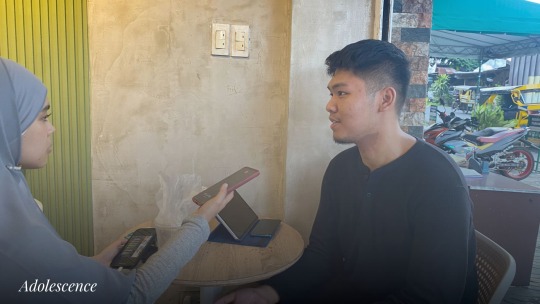
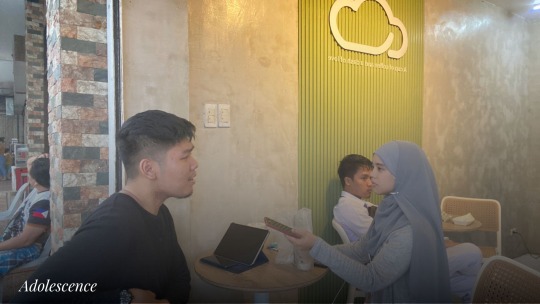

0 notes
Text
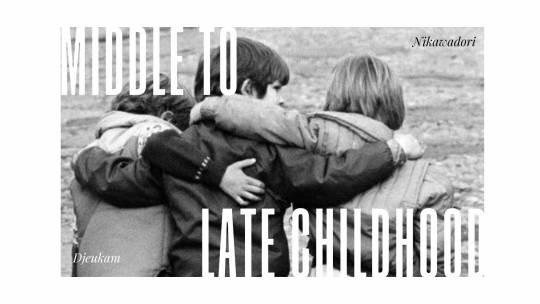
Middle to late childhood takes place at 6 to 11 years of age. In this period of development, children have now further developed their physical, cognitive, and socioemotional aspects of development. In the past interviews, we had only asked about the children from their caregiver’s perspective. Now, starting in this period, we will be interviewing individuals on each developmental period.
Meet "Haru"
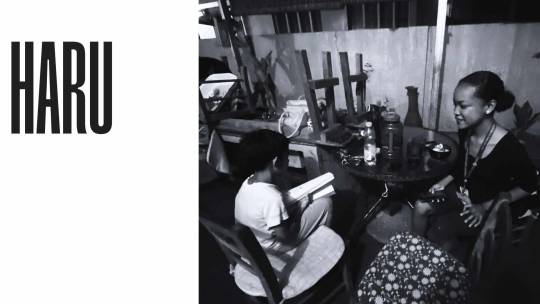
Haru is an 8-year-old kid who is in his 3rd grade in elementary school. We asked Haru questions with regard to his physical, cognitive, and socioemotional milestones and also made an observation of his behavior and actions throughout the interview.
At first, Haru was shy, just like Mavi in the previous interview in early childhood. However, unlike Mavi, Haru warmed up to us easily. He entertained our “warm-up” questions when asked about the slime he was working on. He then went on to make slime for us and also asked us to solve his Rubix cube. Much to his dismay, we did not know how to solve it. The interview did not begin for about 20 minutes as we let the child warm up to us before we proceeded to the questions.
Physical
Haru likes playing sports, especially basketball. He usually plays basketball with his school friends. According to him, he was always able to shoot the ball on the basketball ring despite how tall the ring was compared to him. He has a lot of friends, ranging from elementary to senior high school, grade 11, according to him. Among them, his friends from grade 3 and grade 4 are the ones he usually plays basketball with. Aside from playing basketball, he also plays other games with his friends, such as racing. And among the friends he plays this game with, he would always come 3rd. In addition, Haru stated that he was the fastest in racing among his girl friends. Haru also likes to ride his bicycle. Upon asking about this, Haru’s eyes lit up, and told us a story where he stumbled as he rode his bicycle and hit the neighbor’s parked car. This resulted in him wounding his mouth. He also told us that he knows how to ride a bike that is taller than him. This made us reflect on one of the lessons in this subject that at 5 years of age or more, children are even more adventurous and love to play vigorously. Thus also exercising their bodies.
We have noticed that despite Haru’s age, he was small. Thus, when asked about who was the tallest and the smallest in his friend group, Haru said that he was the smallest among them. Also according to him, the tallest in their friend group was already as tall as one of the interviewers, Mayumi. Haru also told us that he was often teased due to his height, calling him “Hi, gamay”, and he would playfully punch them if they ever did so. Though he might be small for his age, children at this age continue to grow and develop, as every one’s pacing of development is different. He might be small now, but there is a possibility of him growing twice his current size.
Cognitive
Haru’s favorite subjects in class are Nihongo and Math. As we were about to ask further questions regarding this, he walked off and grabbed his notebook in nihongo to show to us. However, the child got distracted and began to answer his assignment. Thus the interview was halted for a few minutes as his attention had shifted from us to his assignment. As he was attending to his Nihongo subject, we noticed that he knows how to write well in Nihongo, such as the words “mountain”, and “bird”, and he also knows how to count in Nihongo. After about a few minutes, we were able to get back to asking Haru questions, this time, about math. Despite not excelling in the said subject, Math was still Haru’s favorite subject. Then, we assessed his knowledge in math by asking him some equations in addition and multiplication. He was able to answer the questions with ease. Thus we disagree with his statement about him not excelling in math because he was able to answer us during the quick assessment. Whenever Haru was having a hard time solving mathematical equations, his strategy was to use sticks and count them in order to get the answer. Also, he would ask the help of his teacher whom he calls “Sensei”. Science has also gained interest and new knowledge in the subject of Science since it was what they had discussed in their class prior to our interview.
Socioemotional
Haru made friends easily and was the one who would initiate conversations with people who he wanted to become friends with. Whenever he wanted to make new friends, he would come up to the person and say “Who are you?” in a playful manner.
Conflicts would also arise at ages like Haru’s, especially among friends. When Haru gets angry, what he does is isolate himself from his friends and just sit until his anger subsides. He is not the type of person to lash out his anger at someone. Instead, he would tell his teacher about it. For us interviewers, it amazes us how at such a young age of 8, Haru can regulate and control his emotions, most especially such strong emotions as anger. But then, this situation made us reflect on what we have read in our book that children in elementary years are able to control their emotions even though they are still in the process of developing them.
Overall, Haru was very interactive with us and immediately warmed up to us even when this was the first time we had seen each other. Though he had warmed up, we noticed that he was still shy to come closer to us and would prefer having distance between us. But there were times when he would come closer to us, especially when talking about the things he liked like riding his bicycle, Nihongo.
DOCUMENTATION
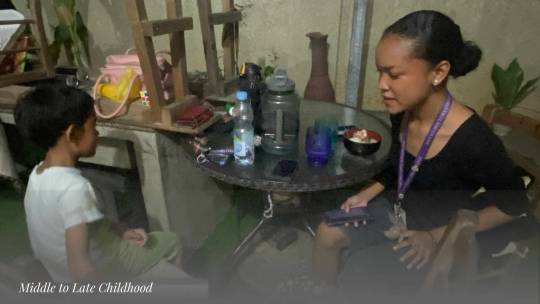
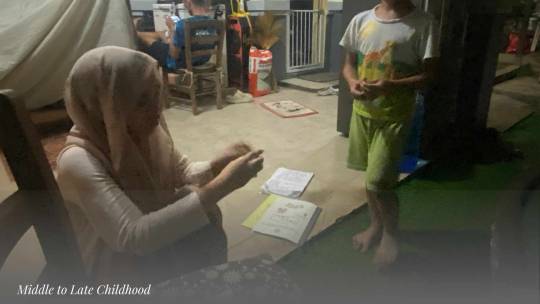

0 notes
Text
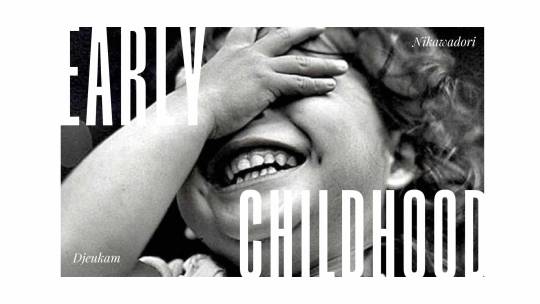
Taking care of a child is no easy task, especially during times when they are still curious about their surroundings and how things work. Early childhood is one of the periods of development that occurs from 3 to 5 years of age. Here, the child’s physical, cognitive, and socioemotional development gets critical, as the brain is highly plastic, meaning, it can change and adapt due to experience. It takes a lot of patience and energy to care for a child at this period of development, just as Carla has with her 4-year-old daughter Mavi.
Meet "Carla" and "Mavi"
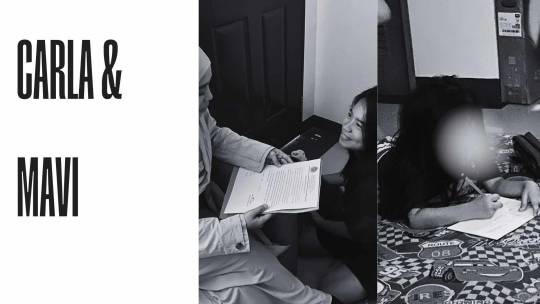
Carla is 32 years old and a mother to her 4-year-old daughter, Mavi, her eldest child. We asked Carla some questions and observed her child about the physical, cognitive, and socioemotional factors of development.
Physical
Despite her age, Mavi is tall and huge, even taller and bigger than one of her cousins who was older than her. Upon asking Carla about her daughter’s physical growth, she stated that Mavi was a very advanced kid. She knew how to sit by 5 months on her own, stand by 8 months, and walk by the age of 10 months with no assistance. In addition, once Mavi hit the age of 12 months, she was able to walk far places independently.
Carla usually let her child play outside the house during afternoons, around 4:30 pm, since it would get scorching hot outside during mornings. Hence, she makes sure Mavi stays inside by the time the sun is still shining brightly. She lets Mavi play outside for her to develop her skills. Furthermore, Mavi’s favorite things to do when playing are riding her bicycle and scooter, and now she also has begun playing badminton though she is still not that skilled in the game.
Mavi was not the type of kid who uses gadgets, at least she was not using one by the time we were there. Carla emphasized her concern about letting her kid use gadgets, as according to her, when there were times when she would let Mavi use gadgets, it seemed like she would imitate the actions and behaviors that she would watch on YouTube. As Carla stated this, we thought about how this situation is in relation to Albert Bandura’s social learning theory which states that learning occurs through observing, imitating, and modeling. Moreover, she was also concerned that letting her child get engrossed in gadgets would delay Mavi’s overall development. On the other hand, upon asking about Mavi’s physical development, there were no delays with regard to it.
Cognitive
Mavi is already in Kindergarten and is already able to write her name properly. She is a fast learner and listens attentively to her teacher during class. When we were there, Mavi was writing on her paper. Also, Carla stated that her child loves to draw, but said as she chuckled that only Mavi herself could understand what she would draw. She would usually draw scribbles and would tell her that it was a person. Upon hearing this, we thought of Jean Piaget’s stages of development, wherein one of the stages in the preoperational stage, the symbolic function substage, children at this age would give mental representation to objects that are not present, such as this situation of Mavi. In relation to this, Mavi was a curious kid, always asking questions and was eager to know the answers to her questions. This made us, the interviewers, think about the other substage of the preoperational stage, the Intuitive thought substage where children ask questions to understand the world around them. With this, Mavi was indeed in her preoperational stage of cognitive development.
Mavi, at the age of 4, can talk coherently and fluently. We asked Carla about the reason why, and she stated that since she was a working mom, she would bring Mavi to work every day because her father was also working. Thus, no one would take care of Mavi but her. Carla’s coworkers served as Mavi’s playmates, also at their previous house, Mavi was always surrounded by adults. They never baby-talked and would always talk in complete sentences when talking to her. Hence Mavi’s fluency in talking at such a young age. In line with this whenever Carla would ask Mavi some favors such as throwing a piece of garbage, she would reluctantly comply and would always say “Si mama uy sige’g sugo sugo.”
Socioemotional
Mavi was silent at first and did not interact with us. It was as if she was observing us since we saw her watching us as we conversed with her mother. But soon, along with her cousins, Mavi slowly got used to our presence and was trying to get our attention by poking us, and when we would look back, she and her cousins would giggle. However, she has not warmed up to us that much yet, since when we tried to talk to her, she would not entertain us. Carla stated that Mavi was usually like this when encountering new faces, shy at first, and would slowly warm up until she became talkative. Even when making new friends, she would at first observe the kid and would later on try to grab the child’s attention. On adults, however, if she is not familiar with the person, she would be silent and would not utter a word to them.
Mavi is an emotional child according to Carla. She wants to be loved and to be given affection all the time, especially at nighttime when her mother would make her youngest child sleep by patting, Mavi also wanted to be patted to sleep. In addition, Mavi would not cry when Carla would leave, not unless her mother would explain the reason why she had to go. There was one time that Carla had to explain to Mavi that she would be going to buy milk next door, and had asked Mavi to take care of her brother for a while. She complied with what her mother asked her to do and never cried when she left. Mavi also did not cry during her first day of school in Nursery. She was excited to go to school and to learn to the point that Mavi herself begged her mother to enroll her in a nursery. Supposedly, Mavi was gonna be enrolled at 5 years old, however, she began going to daycare by 3 years of age from how excited she was.
We were not able to interact that much with Mavi due to her shyness and lack of time. However, from what we have observed and from Carla’s answers to our questions. Mavi’s development was smooth and normal. At the age of 4, she was able to read and write, she was also allowed to play outside and explore, thus developing her socioemotional aspects of development. In communication, she is advanced. At such a young age, she was able to incorporate some words normally children at that age would not know yet. In addition, she also knows how to speak in English, though not as fluently as she is in her mother tongue. Upon observation and from asking Carla questions, we have realized the importance of the environment and social interaction in a child’s development, just like what the Russian psychologist Lev Vygotsky emphasizes.
To Mavi, may you continue to enjoy life socializing with others and grow as the best person you wish to become.
To Carla, I hope you continue to cherish and take care of your child in ways you already do. Let her explore the world with curiosity and guide her in everything that she wishes to do.
DOCUMENTATION
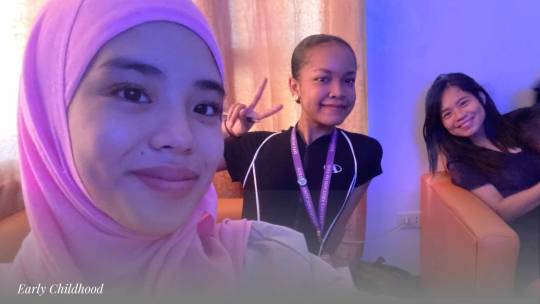

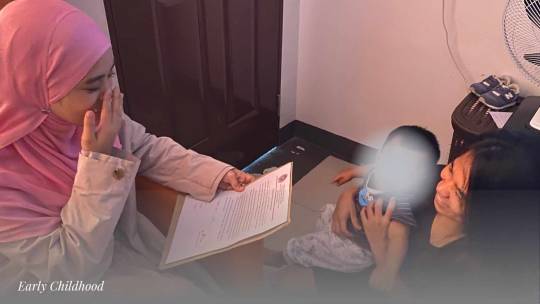
0 notes
Text
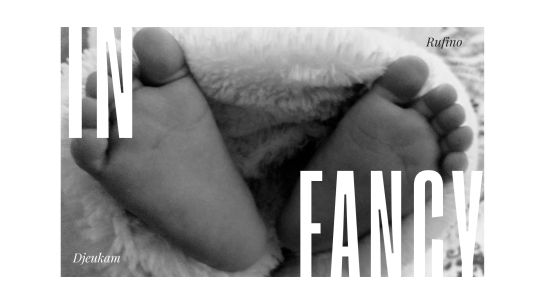
Infancy is the earliest stage of a child's life. This stage lasts from birth, to 18 to 24 months after conception. To know more about infancy and its milestones, we have interviewed a caregiver and have observed her infant during the interview.
Meet "Anan" and "Timtim"

Anan is 43 years old, and a mother to 16-month-old Timtim. The 16-month-old infant is Anan's third, and youngest child. We asked her questions about Timtim's Physical, Cognitive, and Socioemotional milestones, as well as Anan's challenges and satisfaction that she experienced as Timtim's caregiver.
Physical Milestones
We asked Anan about Timtim's physical milestones during his first year. Anan said that Timtim had less crawling experience and was able to walk in his eleventh month.
Second, we asked how a baby's movement and physical skills develop from birth. According to his mother, the baby is fast at learning physical skills, such that he was able to walk when he was 11 months old.
Lastly, we asked about the signs that show if a baby might be uncomfortable or unwell, and how Anan helps with these. The mother stated that one sign that her baby feels uncomfortable is non-stop crying. One reason she considers is constipation, and she treats it with laxative syrup. Also, whenever she is not around, the baby cries and will only be relieved through her presence.
Cognitive Milestones
In this section, we asked Anan about the key mental milestones Timtim had, such as recognizing people. Anan had told us that Timtim is fast-witted. He can already play with a smartphone and knows how to choose the YouTube videos he prefers.
Second, we asked how playing and exploring affect the baby's thinking skills. The caregiver stated that the 16-month-old infant likes shooting things inside his toy box. Also, he likes hiding stuff. These habits are what the baby enjoys. Furthermore, Timtim likes to mimic what the people around him do. For instance, if he sees someone in the family opening something, he can easily mimic how the person opens it.
Lastly, we asked if hearing and talking to babies help with their mental development. Anan stated that at his age, he still can not talk in a full sentence, just a murmur. Thus, Timtim expresses his emotions with facial expressions and gestures such as making a fist and showing an aggressive face.
Socioemotional Milestones
In this section, we asked what are the social and emotional milestones for Timtim. Anan stated that he likes kissing and hugging his family, most especially his mother and older brother. Her mother describes Timtim as a sweet and clingy child.
Second, we asked about the baby's reaction to face and voice changes during infancy. According to Anan, the baby’s ability to recognize faces and voices is much more active than before. He can actively recognize who to go with and who to avoid. In addition, she describes him as a papa’s boy.
Lastly, we asked how Anan, as the caregiver, tells if the baby feels securely attached, and how she can support this. She stated that the baby would not let go of his mother or father and would cry if they put him down. And they would deal with it by distracting him and letting him play with toys or outside with the supervision of his grandma.
Challenges and Satisfaction Experienced by the Caregiver
In this section, we asked about the difficulties Anan faced as a caregiver with Timtim. She stated that constipation and teething are most likely the common issues Anan faced with Timtim.
Second, we asked how the caregiver manages her stress and stays well while taking care of the baby. Anan stated that she would shrug off the thought of stress and sleep to ease her headache.
Lastly, we asked about the happy moments she experienced with her baby. Anan stated that seeing her baby in a healthy state makes her happy and that alone is enough for her to consider as a happy moment.
Observation
We have acquired answers concerning the infant and observed Timtim after the interview. Based on our observation, Timtim is a calm child. Most children when a stranger would come up to them would cry. Timtim, however, did not cry and just went on to do whatever he was doing. Furthermore, at only 16 months, he was walking very well without any guidance from someone. We also noticed that he could climb their family-owned tricycle at ease.
When his father went to work, we noticed that Timtim cried. However, it was only short-lived because his mother breastfed him, thus distracting him from the fact that his father was away. After that, Timtim went back to playing.
1 note
·
View note
Text

Conception is a stage wherein a sperm cell fuses with an ovum, or egg cell, in the fallopian tube. This process is called fertilization. In other words, conception is the action of conceiving a child. According to the Philippine Statistics Authority (PSA), the fertility rate of women in the Philippines, which ranged between the ages of 15 and 49 years, was 1.9 children per woman. That is based on the National Demographic and Health Survey (NDHS) preliminary results in 2022. We have interviewed one woman who is currently in the conception stage, and below, we will be documenting her responses to the questions we have prepared.
Kang is 25 years old and is one month pregnant with her second child. We asked her questions with regard to her physical, cognitive, and socioemotional adjustments, challenges faced during her pregnancy, and the pleasure she is experiencing during pregnancy. Each category consisted of three questions.
Meet "Kang"
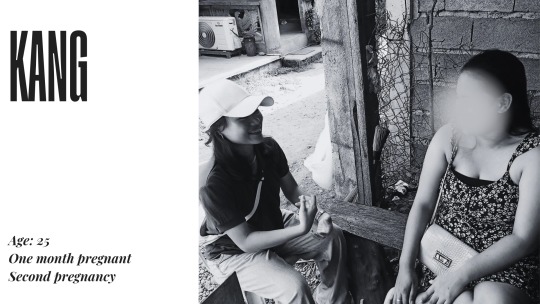
Physical Adjustments
We asked Kang what are the common physical symptoms she felt during her pregnancy, and according to her, the common physical symptoms during the first trimester of her pregnancy included vomiting, nausea, intense sense of smell, aversion towards strong smells such as chili oil, and smokes.
Second, we asked her if the growing belly affects her daily activities and comfort. According to her, it affects her in a way that she is having a hard time picking up things from below her knees, she is also having a hard time breathing sometimes and has discomfort in sleeping due to her limited sleeping position.
In line with her response, we asked about the things that help her ease the discomforts she feels during her pregnancy. Kang said that a thick pillow helps her feel comfortable due to the elevated position which can help her ease and avoid back pain.
Cognitive Adjustments
We asked Kang how pregnancy hormones affect her memory and concentration. So far, according to her, there are still no changes, and her memory and concentration are just the same as before.
Second, we asked what mental challenges she might have faced and what she would do to deal with them. Kang responded by saying she gets easily irritated and has a lack of patience during her pregnancy, and she deals with it by calming herself down. She did not specify further the ways she can calm herself down.
Lastly, we asked Kang about how being tired during pregnancy affects her thinking, and the ways she does to help with this. She stated that whenever she is tired, it causes her to have a headache and she just deals with it by sleeping.
Socioemotional Adjustments
In this section, we asked Kang what are the emotional changes she noticed during her pregnancy. She stated that she felt a lack of patience and that she would have mood swings.
Second, we asked Kang if her relationship with her partner and family changed during pregnancy. According to her, her partner and family had become more caring towards her during her pregnancy.
Lastly, we asked how the support from her friends and family helped with her emotional changes during pregnancy. She stated that the support from her friends and family helps her deal with the intense cravings she has and the lack of patience. Furthermore, she likes spending time with her friends and family because of the joy they bring to her, thus keeping her entertained.
Challenges
In this section, we asked Kang questions with regard to the challenges she faced during her pregnancy:
Since Kang is working as a vendor, we asked her what the problems she faced while balancing both work and pregnancy and what are the things she do to manage them. She stated that her work life makes her pregnancy more bearable because it keeps her momentum in being productive despite her being pregnant.
Second, we asked her if financial worries affected her in her pregnancy. Kang stated that money does not worry her that much because she makes her own money.
Lastly, we asked Kang what are the issues she faced from not sleeping well during pregnancy and how can these issues be solved. She said that whenever she couldn't sleep, she would use her phone since it helps her to sleep. In addition, her husband would sometimes message her to sleep.
Pleasure Experienced During Pregnancy
In the last section, we asked Kang the things that bring joy to her as a pregnant woman. Her happiness during pregnancy, according to her, stems from her supportive husband and family. Her cravings are well provided and she is well-loved.
Second, we asked her about how feeling the baby move made her feel. Since she is still in her first month of pregnancy, there is no notable movement yet. However, she could feel a slight flick in her stomach which, according to her, might be coming from the baby's heartbeat.
Lastly, we asked her about the happy moments that are related to her pregnancy, such as milestones and celebrations. She stated that being pregnant alone makes her happy, and it would be a bonus happiness if what she is conceiving is a baby boy.
Based on the answers she has given us and upon observing during the interview, Kang has an optimistic view of pregnancy. One of the factors of her optimistic mindset was probably due to the support she has with her family, friends, and partner. Furthermore, her responses to our questions also relate to her first pregnancy and not just solely from her current pregnancy.
2 notes
·
View notes